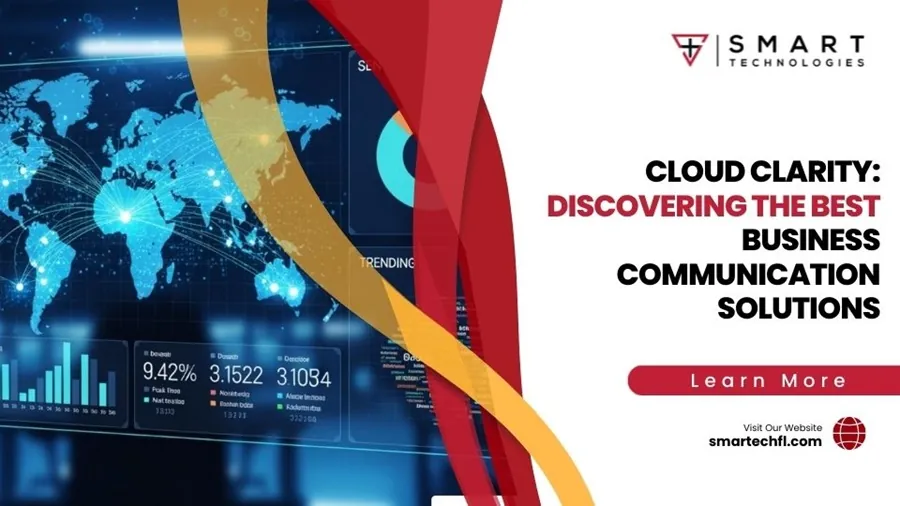How Managed IT Solutions Can Improve Efficiency in Your Office
Managed IT Solutions Can Improve Efficiency
Businesses rely heavily on their IT infrastructure to maintain operations and stay competitive. Managed IT Solutions have emerged as a crucial component for companies aiming to optimize their tech resources, streamline their processes, and ensure robust security measures.
These solutions encompass a wide range of services designed to manage, monitor, and maintain IT systems, enabling businesses to focus on their core activities while leveraging expert support. Managed IT Services offer a comprehensive approach to handling IT needs, ensuring efficiency and reliability.
What Are Managed IT Solutions?

Managed IT Solutions refer to a suite of services provided by specialized IT companies to manage a business’s IT infrastructure and end-user systems. These services are designed to be proactive, preventing issues before they occur and ensuring that the IT systems operate smoothly. Here’s a deeper look into what Managed IT Solutions encompass:
Types of Managed IT Services
- Network Services: Managed network services include the design, implementation, and maintenance of network infrastructure. This ensures that all devices within a business are interconnected and can communicate efficiently. Services typically cover everything from setting up local area networks (LANs) and wide area networks (WANs) to managing internet connectivity and ensuring network security.
- Cloud Solutions: With the increasing reliance on cloud computing, managed cloud solutions have become essential. These services include the migration to cloud platforms, management of cloud-based applications, and ensuring data security in the cloud. Businesses can choose from various cloud service models such as Infrastructure as a Service (IaaS), Platform as a Service (PaaS), and Software as a Service (SaaS).
- Cybersecurity: Cyber threats are a significant concern for businesses of all sizes. Managed IT Services provide comprehensive cybersecurity measures, including threat detection and response, firewall management, antivirus solutions, and employee training on cybersecurity best practices. This proactive approach helps in safeguarding sensitive data and maintaining the integrity of IT systems.
- Data Backup and Disaster Recovery: Data is one of the most valuable assets for any business. Managed IT Solutions include regular data backups to ensure that data can be restored in case of accidental loss, hardware failure, or cyber-attacks. Disaster recovery solutions involve creating strategies and systems that allow businesses to quickly resume operations after a catastrophic event.
- IT Support and Help Desk Services: Managed IT providers offer continuous IT support, ensuring that any technical issues encountered by the business are resolved promptly. This includes providing a help desk for employees to report and get assistance with their IT problems.
Benefits of Managed IT Solutions
Adopting Managed IT Solutions brings several key benefits to businesses, enhancing their operational efficiency and reducing overall costs. Here’s how:
Efficiency and Productivity
Managed IT Services allow businesses to operate more efficiently by ensuring that IT systems are always up-to-date and functioning correctly. This minimizes downtime and disruptions, enabling employees to work without interruptions. Proactive monitoring and maintenance prevent issues from escalating, ensuring that business operations remain smooth and efficient.
Cost Savings
By outsourcing IT services, businesses can save on the costs associated with hiring and training in-house IT staff. Managed IT providers offer a predictable pricing model, usually in the form of monthly subscriptions, which helps businesses budget their IT expenses more effectively. Moreover, the reduction in downtime and the prevention of costly IT issues further contribute to cost savings.
Proactive Management and Support
Managed IT providers use advanced tools and technologies to monitor IT systems round-the-clock. This proactive approach ensures that potential issues are identified and resolved before they can impact business operations. Regular maintenance and updates keep systems running optimally, reducing the risk of unexpected failures.
Scalability and Flexibility
As businesses grow, their IT needs evolve. Managed IT Solutions offer the flexibility to scale services up or down based on the business’s requirements. Whether a business is expanding its operations, introducing new technologies, or dealing with seasonal fluctuations, Managed IT Services can be adjusted to meet changing demands.
Enhanced Security
Security is a paramount concern for businesses. Managed IT providers implement robust security measures, including firewalls, encryption, and intrusion detection systems, to protect against cyber threats. Regular security assessments and compliance audits ensure that the business meets industry standards and regulations, reducing the risk of data breaches and other security incidents.
Core Components of Managed IT Services

Managed IT Services encompass a broad range of solutions designed to cover all aspects of a business’s IT needs. This comprehensive approach ensures that every part of the IT infrastructure is monitored, maintained, and optimized for peak performance. Here, we explore the core components of Managed IT Services:
Managed Network Services
Managed network services are fundamental to ensuring seamless connectivity and communication within a business. These services involve the design, implementation, and ongoing management of network infrastructure. By leveraging managed network services, businesses can achieve optimal network performance, enhance security, and ensure reliable connectivity.
Key Benefits:
- Improved Network Performance: Managed network services ensure that the network is optimized for speed and reliability, minimizing latency and downtime.
- Enhanced Security: Managed services include the implementation of firewalls, intrusion detection systems, and other security measures to protect the network from cyber threats.
- Proactive Monitoring: Continuous monitoring of network performance allows for early detection and resolution of potential issues, ensuring uninterrupted operations.
Cloud Solutions
Cloud solutions have revolutionized the way businesses operate by providing flexible, scalable, and cost-effective alternatives to traditional IT infrastructure. Managed cloud solutions encompass various services, including cloud migration, management, and security.
Types of Cloud Services:
- Infrastructure as a Service (IaaS): Provides virtualized computing resources over the internet, allowing businesses to avoid the costs and complexities of owning and managing physical servers.
- Platform as a Service (PaaS): Offers a platform allowing customers to develop, run, and manage applications without dealing with the underlying infrastructure.
- Software as a Service (SaaS): Delivers software applications over the internet on a subscription basis, eliminating the need for installation and maintenance.
Benefits of Cloud Solutions:
- Scalability: Cloud services can be easily scaled up or down based on the business’s needs, providing flexibility and cost savings.
- Accessibility: Cloud solutions enable employees to access data and applications from anywhere, fostering remote work and collaboration.
- Cost Efficiency: Reduces the need for physical infrastructure and associated maintenance costs, with a pay-as-you-go pricing model.
Cybersecurity
Cybersecurity is a critical component of Managed IT Services, aimed at protecting businesses from cyber threats such as malware, ransomware, and data breaches. Managed cybersecurity services provide comprehensive protection through a combination of advanced technologies and expert oversight.
Key Cybersecurity Services:
- Threat Detection and Response: Proactively identifies and mitigates potential security threats before they can cause damage.
- Firewall Management: Implements and manages firewalls to prevent unauthorized access to the network.
- Employee Training: Educates staff on cybersecurity best practices to reduce the risk of human error leading to security breaches.
- Regular Security Assessments: Conducts periodic security audits to ensure compliance with industry standards and regulations.
Managed IT Solutions for Business Continuity
Ensuring business continuity is a primary goal of Managed IT Solutions. This involves strategies and systems designed to keep operations running smoothly in the face of disruptions, whether due to cyber-attacks, natural disasters, or system failures.
Disaster Recovery Solutions
Disaster recovery solutions are essential for businesses to quickly recover and resume operations following a catastrophic event. These solutions involve creating a comprehensive disaster recovery plan that includes regular data backups, redundant systems, and predefined recovery procedures.
Importance and Benefits:
- Minimizes Downtime: Ensures that critical systems can be restored quickly, minimizing the impact on business operations.
- Protects Data Integrity: Regular backups and secure storage ensure that data remains intact and can be restored without loss.
- Enhances Resilience: Preparedness for various disaster scenarios enhances the business’s ability to withstand and recover from unexpected events.
Data Backup and Recovery
Regular data backups are crucial for protecting against data loss due to hardware failures, cyber-attacks, or accidental deletions. Managed IT Services include automated backup solutions that ensure data is consistently and securely backed up.
Best Practices for Data Backup:
- Automated Backups: Implementing automated backup processes to ensure data is regularly and consistently backed up without manual intervention.
- Offsite Storage: Storing backups in offsite or cloud locations to protect against physical damage to on-site systems.
- Regular Testing: Periodically testing backup and recovery processes to ensure data can be restored effectively when needed.
Leveraging Managed IT Solutions for Growth

Managed IT Solutions play a significant role in helping businesses grow by streamlining operations, enhancing customer experience, and providing a competitive edge.
Streamlining Operations
By outsourcing IT management to experts, businesses can focus on their core functions without being bogged down by IT-related issues. Managed IT Services ensure that IT systems are running smoothly, reducing the administrative burden on in-house staff.
Enhancing Customer Experience:
- Reliable IT Systems: Ensuring that customer-facing applications and systems are always operational, leading to a better user experience.
- Quick Issue Resolution: Promptly addressing IT issues to prevent disruptions that could affect customer satisfaction.
Providing a Competitive Edge
Managed IT Solutions enable businesses to leverage cutting-edge technology solutions and expert insights, staying ahead of competitors.
Key Advantages:
- Access to Expertise: Gaining access to a team of IT experts who can provide guidance and support.
- Innovative Solutions: Implementing the latest technologies and best practices to improve efficiency and productivity.
- Scalable Solutions: Adapting IT services to meet evolving business needs, allowing for seamless growth and expansion.
Choosing the Right Managed IT Service Provider
Selecting the right Managed IT Service Provider is crucial for maximizing the benefits of managed IT solutions. Businesses should consider several factors when making this decision:
Key Considerations
- Expertise and Experience: The provider should have a proven track record and extensive experience in managing IT services for businesses similar to yours.
- Range of Services Offered: Ensure that the provider offers a comprehensive suite of services that cover all your IT needs.
- Customer Support and Responsiveness: The provider should offer prompt and reliable customer support, with a focus on resolving issues quickly and efficiently.
What People May Also Ask
What are Managed IT Solutions?
Managed IT Solutions refer to outsourced IT services that cover the management, monitoring, and maintenance of a business’s IT infrastructure.
How do Managed IT Services benefit businesses?
These services improve efficiency, reduce costs, enhance security, and provide scalable solutions to meet evolving business needs.
What types of services are included in Managed IT Solutions?
Managed IT Solutions include network services, cloud solutions, cybersecurity, data backup and recovery, and IT support.
How to choose the right Managed IT Service Provider?
Consider the provider’s expertise, range of services, and customer support capabilities.
Conclusion
Managed IT Solutions offer a comprehensive approach to managing a business’s IT needs, providing benefits such as enhanced efficiency, cost savings, and improved security. By partnering with the right Managed IT Service Provider, businesses can leverage expert support and cutting-edge technologies to achieve their goals and maintain a competitive edge.
For award-winning Managed IT Solutions, contact us today and discover how we can support your business’s growth and success.
You can contact us by phone, email, or by visiting our offices:
- Phone: (386) 261-8323
- Email: contact@smarttechfl.com
- Address: 771 Fentress Blvd. #10, Daytona Beach, FL 32114












